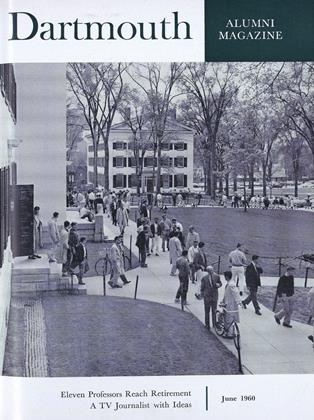Harold L. Bond '42. Oxford:Clarendon Press, 1960. 167 pp. $3.40.
Happy the scholar, be he British or - all the more - American, whose book achieves, as has Professor Harry Bond's, the honor of being published by the Clarendon Press. What is equally gratifying is the fact that British reviewers, who have been known to find it not impossible to condescend to American scholarship, have been lavishing praise on Professor Bond. The Daily Telegraph speaks of his book as "a brilliant piece of criticism." Lest anyone find this as frightening as it is impressive, let me hasten to add that the book is delightfully readable, without any of the pretentiousness that frequently disfigures literary criticism. Sir Steven Runciman, writing in the Spectator, remarks that "Professor Bond performs his anatomical dissection with clarity and grace; and the result is both stimulating and persuasive." The Times says of the book that it is "just, stimulating, and easy to read."
Professor Bond examines The Decline and pall as a piece of literature. He shows that it was intended to be an epic in prose, thus not unlike (and probably consciously modeled after) Paradise Lost. There follow chapters on the organization and structure of the whole, as well as discussions, with conclusive examples, of the adroit and subtle ways by which Gibbon managed his transitions and kept up interest and avoided monotony through the variety of his sentence structure and Ms skilful use of irony. All this is analyzed modestly but unequivocally. I expect Professor Bond's book will be a notably influential one. It will send all of its readers to Gibbon or back- to Gibbon, and it ought to affect greatly the content of innumerable college survey courses in the "humanities" or "civilization." The Bond volume has made me realize as I never did before that The Decline and Fall is a book extremely characteristic of the ideals and preconceptions of the Enlightenment, as much so as any of them all. It is, moreover, "a monument to the faith that man can, under conditions of freedom, and by the cultivation of his reason, civilize himself and his world" (p. 164). This is a lesson for our century as well as for Gibbon's. "There is much to learn from Professor Bond," writes Sir Steven. Much indeed.
 View Full Issue
View Full Issue
More From This Issue
ARTHUR M. WILSON
-
 Article
ArticleDemocratic Thought
December 1941 By ARTHUR M. WILSON -
 Books
BooksRAYMOND OF THE TIMES
October 1951 By Arthur M. Wilson -
 Books
BooksETHICS IN A WORLD OF POWER: THE POLITICAL IDEAS OF FRIEDRICH MEINECKE
MARCH 1959 By ARTHUR M. WILSON -
 Books
BooksTHOUGHTS FROM ADAM SMITH.
JUNE 1963 By ARTHUR M. WILSON -
 Books
BooksMIDDLING NESS:
APRIL 1966 By ARTHUR M. WILSON -
 Books
BooksPINE LAKE.
MAY 1972 By ARTHUR M. WILSON
Books
-
 Books
BooksFaculty Publications
February 1935 -
 Books
BooksLake Unlocked
SEPT. 1977 By CHARLES T. MORRISSEY '56 -
 Books
BooksWILLIAM E. CHANDLER, REPUBLICAN
February 1941 By CLAUDE N. FUESS -
 Books
BooksComplex Occurrences
DEC. 1977 By F. David Roberts -
 Books
BooksTHE MYSTERY OF "A PUBLIC MAN,"
March 1949 By Merle Curti. -
 Books
BooksSTRANGERS NO LONGER.
JULY 1963 By ROY B. CHAMBERLIN








